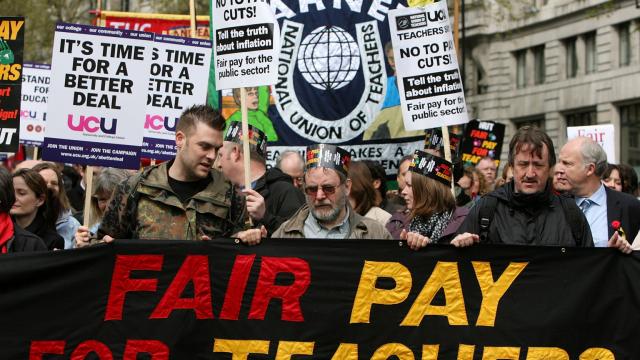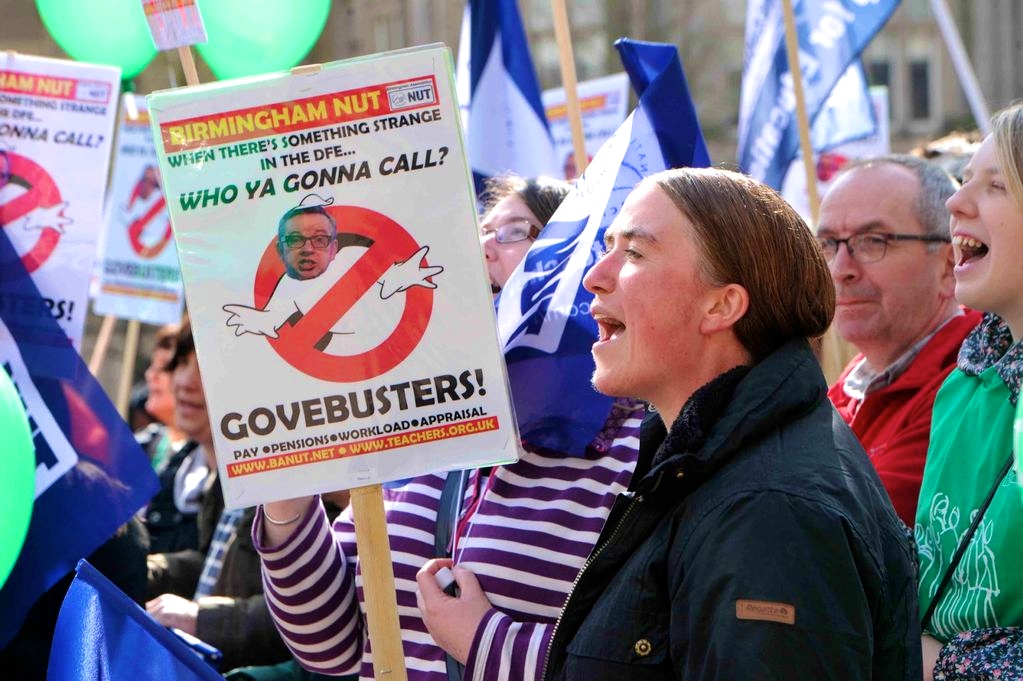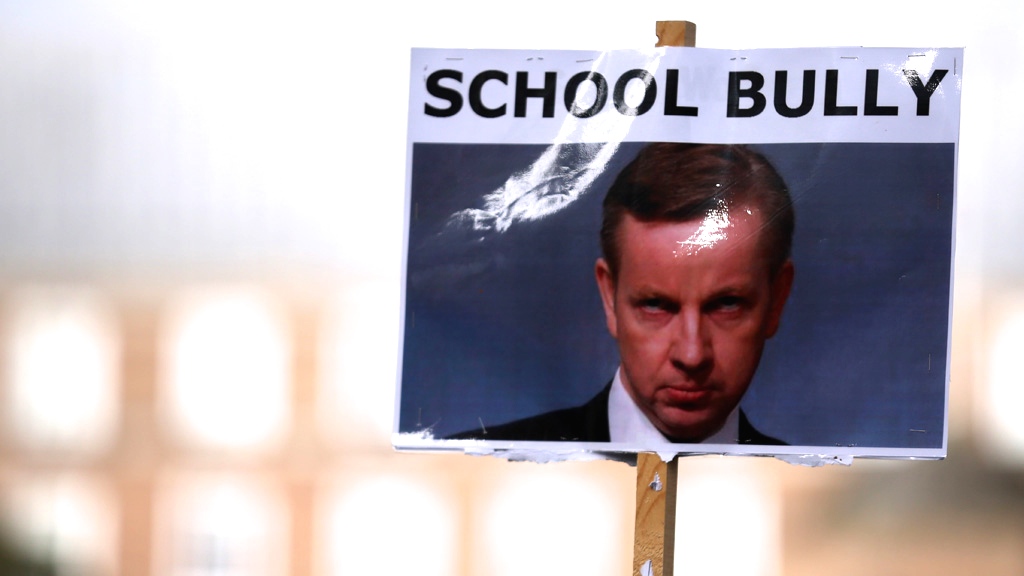
A comfortable salary, a rewarding job, not to mention 12 weeks holidays a year: on the surface teaching sounds like a pretty good profession to be in. However, a series of strikes and threatened action this year over pensions, pay and conditions by teachers in England and Wales tells a different story.
In March, thousands of schools were shut across the region as teachers congregated at picket lines to protest “intolerable pressures” from the government. The strikes were staged by members of the National Union of Teachers (NUT). Christine Blower, NUT's general secretary, referred to the one-day national walk-out as a "success," saying the strikes were a “clear demonstration that teachers are thoroughly tired of the intolerable pressure they are being put under by the coalition government.”
“A Demented Dalek on Speed”
Then, in April, a NUT conference was held in Brighton, in the south of England, to decide on an autumn strike. The strike calls are part of a wider campaign over teachers' pay and workload. The union conference rejected more severe industrial action (ie. strikes) that would include four days of walk-outs in England and Wales this autumn. Members of the teachers union have still to decide whether to strike this June.
During the conference, Ian Murch, the union's treasurer, likened U.K. Education Secretary Michael Gove to “a demented Dalek on speed who wants to exterminate anything good in education that's come along since the 1950s.”
Delegates at the Brighton conference also learned that the NUT wants to put enough pressure on Gove and the coalition government to “radically change their damaging policies towards education, teachers and children.” The conference called for a national demonstration, lobby of Parliament and a broad-based campaign to challenge the British government's education policies.
Morale Worryingly Low
Teachers' morale in Britain is at a recognizable low. With changes to pensions and teachers working 60-hour weeks, many are being driven out of the profession. In 2010, U.K. Chancellor George Osborne announced education spending in England could be cut as much as 25% over the next four years.
Public services, particularly the education sector, have seemed to bear the brunt of the nation's cost-cutting. Government data released in 2012 showed the number of teachers in state schools in England fell by 10,000 that year. The head teachers' organization, the Association of School and College Leaders (ASCL), says budget pressures are forcing head teachers to make difficult decisions to cut staff.
In addition, changes to school curriculum and a greater scrutiny of teachers' performance are putting a huge strain on the vocation. As Celia Birchby, head teacher at a primary school in Cheshire, testifies:
“Michael Gove doesn't value teachers so [he] doesn't care they are having to cope with more rigorous appraisals, a new national curriculum, and raising thresholds of attainment [all at once]. Hence the need to take action – and potential teachers going into other professions.”
Birchby said that despite the disruption within schools caused by the growing union strikes, she is supportive of her teachers who take action for the future of the teaching profession.
Opposition to the Strikes
By contrast, the U.K. government firmly objects to the rising union action. A spokesperson for the Department of Education told the BBC that the March strikes disrupted parents, held back children's education and “damaged the reputation of the profession.”
Countering the condemnation, Dr. Andy Pickard, former head of education at Manchester Metropolitan University, disputes the claim that teacher strikes hold back education or work to the detriment of the profession.
“Unions are entirely democratic institutions, so strike decisions are made by the members. In my experience children never suffer as a consequence given that teachers will always ensure that time lost in strike is made up in other ways,” Dr. Pickard told Occupy.com.
“As a teacher I have been involved in several strikes during my 40-year career. I can testify that the decision to strike is never taken lightly, involving, as it does, loss of pay with the distinct possibility or probability that employers will ignore the action,” he continued.
National Union of Teachers
The NUT, established in London in June of 1870, only recruits qualified teachers and those training to be teachers. With a long and dedicated history campaigning for the advancement of education in Britain, the union currently has some 327,000 members in England and Wales.
Before its creation, teachers – particularly primary school teachers, whom the union largely represents – worked in abysmal conditions in the U.K. with very poor pay. Fifty years later, primary teachers were regarded as a proper profession with appropriate training and adequate conditions of service. Much of this, as Dr. Pickard is keen to point out, is because of the NUT's work.
“The present strikes are about defending those hard won salaries, pensions and service conditions. The children in school would be the first to suffer from any return to 1870,” said the former MMU Head of Education.
The teacher strikes are the most recent example of a larger, nationwide resistance to austerity, privatizations, changes to pensions and lowered wages and Britain.
Cuts Hitting Disabled People the Hardest
For example, in August of 2013, the National League of Blind and Disabled People (NLBDP) carried out a "week of action" to protest against austerity measures and fight for the rights of disabled people. According to a report compiled by 90 organizations and charities representing the disabled, the coalition government's cutbacks are hitting disabled people the hardest.
Similar to the NUT, the NLBDP has a history of big victories showing time and again examples of when the disabled community has come together and won.
Another example of recent U.K. unrest over government policies involves the changes made to pensions. The Chancellor caused outrage in his 2011 budget when he confirmed a cap of public sector pay at 1% for two years. In May of 2012, thousands of public sector workers went on strike over public sector pensions.
Following union action that included massive public sector walk outs, the government offered more favorable accrual rates, which would determine the pace at which pension pots grow.
Similar to other major professional unions, the National Union of Teachers plays a leading role influencing education practices on a national level. And the big turnouts seen at recent demonstrations and strikes in the U.K. suggest two things: resistance to austerity measures is now rampant in the U.K., and the power of trade unions is far from receding.
3 WAYS TO SHOW YOUR SUPPORT
- Log in to post comments













